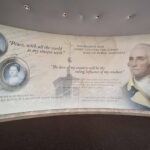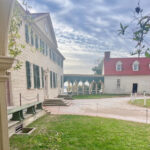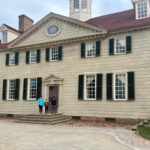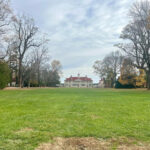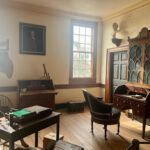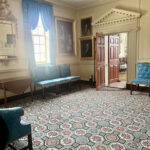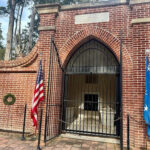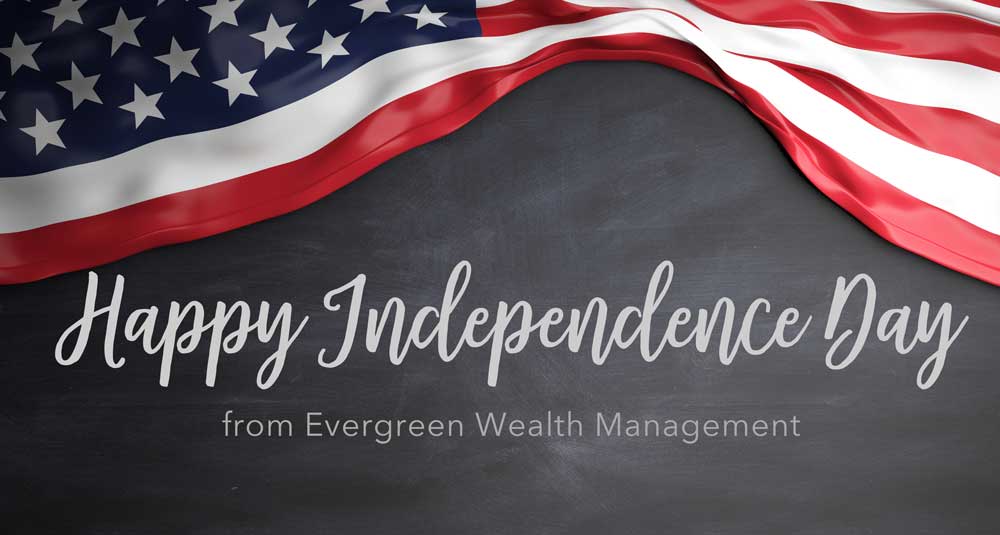
Independence Day is one of my favorite holidays. The best holidays bring fellowship, remembrance, teachable moments, joyful events, and spiritual significance. I hope you enjoy this holiday and another Independence Day article from Evergreen.
Past Independence Day Articles:
What Does Freedom Mean – Explains the adoption of the Declaration of Independence, what our founders knew they were giving up, and the inspiring story of Nathan Hale.
The Black Robe Regiment – The name the British gave to the colonial preachers who helped fuel the fire of liberty in the colonies. I talk about the history of these famous preachers of the revolution, along with three specific examples.
Founding Frenemies – The story about the great friendship & conflict of two of the most famous founders of our country. Both of them died on the same day, America’s 50th anniversary.
Divine Preservation – The story of the fascinating preservation of the “Father of the Nation” and the original Commander & Chief. Along with 4 key pillars to preserve a nation.
Slavery & the Original Declaration of Independence – A quick overview of the original Declaration of Independence that was voted down, all because of a disagreement on the views on slavery.
The Founding of our Freedom – Some people may know our Founders’ values and purposes for writing the Declaration of Independence, but where did they get their values from? We review where our Founders’ idea of our freedoms came from.
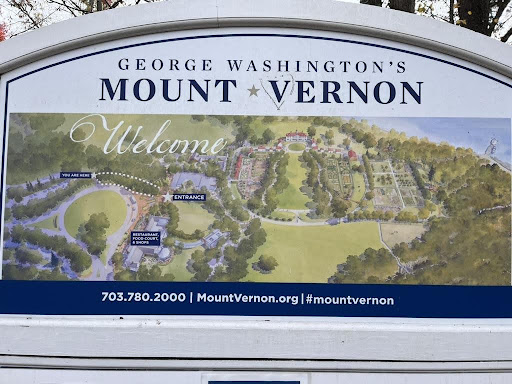 Recent Family Vacation
Recent Family Vacation
I greatly value my family vacations. Early in our marriage my wife and I agreed to prioritize experiences and family time, and it has been a blessing ever since.
Last year we took a road trip through West Virginia, Virginia, and North Carolina. One of our stops was at the estate of George Washington, better known as Mount Vernon (pictures included at the end).
It’s amazing the care the Mount Vernon Ladies Association has taken to preserve the property. Most of the exterior walls, doors, and furnishings inside the home are original. Other buildings used to support the farm, gardens, distillery, gristmill, blacksmith shop, smokehouse, stable, spinning house, greenhouse, salt house, slave quarters, icehouse, dung repository, and storehouses are preserved and furnished as if they would be operable today. My family enjoyed the trip and highly recommend others to visit. You can go to the Mount Vernon website for virtual tours or buy tickets.
I wrote about George Washington in my Divine Preservation article. His role in helping shape our great country is unmatched. Something I learned while I was there is the body of George and Martha Washington is resting on Mount Vernon (see picture at the end). George had specific instructions for his burial. When looking into this I found a sermon given by Peter Thacher after Washington passed. A sermon I encourage you to read.
In this sermon, I am reminded of a few values of Washington I would like to bring to our attention.
Humility
Although strong, commanding, and confident, Washington is known to be a humble man. Probably the greatest way someone can show their humbleness is by giving up one’s power. On two separate occasions, Washington had arguably the greatest power one could possess in the United States that he resigned from. First, as the Commander and Chief of the Revolution. After the victory over the King of Britain, Washington resigned and gave the power he had back to Congress so he could return to Mount Vernon. Second as President of the United States by not running for a third term (there was no amendment at the time saying he couldn’t). Being unanimously selected for his first two presidencies, he surely would have won a third time. Instead, he wanted to return to his beloved estate in Mount Vernon. This also demonstrated how the United States should not have so much power held by one person for so long. Something that was honored until Franklin D. Roosevelt.
After Washington decided to return home King George III of Great Britain said, “ place him in a light the most distinguished of any man living, and that he thought of him the greatest character of the age.”(2)
Washington never had the intention of serving as President. It was Franklin you insisted he attend to preside over the constitutional convention in the first place. It was a sacrifice for Washington to leave Mount Vernon, where he preferred to stay. He viewed his public service as exactly that, a service to the Country. Thacher says:
“To such a man it was self denial to leave the happiness and the security of private life, and again to enter on the fatigues and hazards of elevated station. — But the call of his country General WASHINGTON never declined. The unanimous suffrages of his fellow citizens (an election without a parallel in the history of the world) selected him to administer the free and excellent constitution of government which he had assisted in forming.”(1)
Think of the attitudes and actions necessary for George to command the continental army for the Revolution and to lead a new nation, while also humble enough to step away peacefully from what he worked so hard for. He was truly a leader of war and of peace. It may be important for us to ask how someone is able to gather so much power and respect from others and yet be humble. Thacher gives an answer for us in his sermon:
“ Too often the public virtues of great character are clouded by private views…In the domestic relations; in his private dealings; in his daily department, you always beheld him discreet, amiable dignified! He shone, not with the lustre which dazzles courts and armies, but with the purer, the more honorable rays of private virtue. Was it not a sense of religion which led our late excellent friend to acknowledge, when at the head of our armies, and more lately when he presided in the nation, our absolute dependence upon the God of providence, ascribing the honor of his victories and our deliverance to him who “setteth up one and putteth down another!” In his public instruments; in his last precious legacy to his country and in his private conversation he expressed the deepest reverence for the infinite and eternal being who is “in all and over all, and by whom all things consist.” His constant attendance on the Christian church, is reverend observation of the Lord’s Day, as well as his whole behavior, demonstrated his belief in the religion of the Cross.” (1)
Washington knew that all his accomplishments did not come from him alone. He believed all things happened with the help and hand of God. If this was true, what was there for him to be prideful of? This constant view of his everyday walk is what kept him humble.
Open-minded
Washington was well respected. Thacher says, “His patient endurance of wrong from the envious and the mistake, made him their superior, and converted his enemies into friends. The enemies of his country I mean; personal enemies he had none.”(1) Many of our Founders had strong contentions on how the country was to be put together and move forward. Thomas Jefferson and John Adams possessed many disagreements with each other spoken about in my Founding Frenemies article. Washington avoided most of these by hearing what others had to say. He possessed an open mind willing to listen to ideas, knowing he was not infallible. In his farewell address, Washington said:
“to err is the lot of humanity, and never, for a moment, have I ever had the presumption to suppose that I had not a full proportion of it. Infallibility not being the attribute of Man, we ought to be cautious in censuring the opinions and conduct of one another.” (4)
Thacher said, “In the cabinet he shone equally as in the field. The interests of the Union and of several States he guarded with tenderest care.” (1)
Washington was often caught in the middle of disagreements. An example was with Hamilton pushing his views on a pro-industrial society while Jefferson urged a more agrarian vision. Even though he was a farmer himself, Washington would not let his bias sway the perspective of how the nation should move forward. Instead, he pleaded with both to compromise and told Jefferson in a letter in 1792, “Without more charity for the opinions and acts of one another in Governmental matter it will be difficult, if not impracticable, to manage the Reins of Government or to keep the parts of it together.” (3)
As both Hamilton and Jefferson gave thoughtful reasons for their claims Washington’s response was, “mortals possessed no infallible rule by which we could fore judge events… a middle course would be found the best, until experience shall have pointed out the right mode.” In other words, let us give time to cautiously experiment with our ideas and only draw hard conclusions when evidence is abundant.
Conclusion
This election year may bring feelings of hesitation and uncertainty. At Evergreen we know that from an investment perspective elections are not as influential as clients may think. As our country has evolved, different parties and viewpoints have been in charge of the executive branch. While some policies are better than others, the winner of this year’s election doesn’t change our investment recommendation much. Your advisors have put together a good plan for you to follow during terms of presidents you like and presidents you don’t like.
Let us embody these principles held in high regard by Washington. We should be more humble and open-minded. Let us be aware of the biases we have in our lives when making decisions. When something good happens it may be because of our great effort, or it may be from the help of something (or someone) else. We may feel strongly about our rationale, but has it been tested enough with evidence to support it? Let us move forward cautiously knowing that a middle ground is often the answer.
Above all keep principles, morality, and faith as a firm foundation as Washington did. This will be necessary to continue preserving our republic. Thacher said:
“On imbibing the principles recommended by our late illustrious chief, equally distant from tyranny and licentiousness, depends the safety of our country. If we wish to be great among the nations abroad, and to be peaceful and happy at home, we must preserve inviolably our union. We must guard against improper foreign connections. We must maintain a spirit of mutual forbearance and good will, and must cultivate especially those principles of religion and morality which are the only solid cement of society, and the only firm foundation of liberty. Where God is neglected; where the religion of Christ is denied; where men are governed not by reason or religion, but by party views and furious passions, there may be the name of liberty, but the thing never can exist.” (1)
Happy Independence Day
Andrew Nutter
A special thank you to Wallbuilders.com.
- “Sermon – Death of George Washington – 1800.” WallBuilders, 19 Oct. 2023, wallbuilders.com/resource/sermon-death-of-george-washington-1800/.
- Clark, Harrison (1996). All Cloudless Glory: The Life of George Washington: Making a Nation. Regnery. pp. 349–350. ISBN 978-0-895-26445-9. Archived from the original on 2018-02-20.
- Dunn, Susan. “George Washington’s Sacred Union.” George Washington’s Mount Vernon, www.mountvernon.org/george-washington/the-first-president/george-washington-s-sacred-union/#:~:text=Washington%20believed%20that%20his%20countrymen,own%20social%20and%20political%20destiny. Accessed 1 July 2024.
- Washington, George. “George Washington Papers, Series 2, Letterbooks 1754-1799: Letterbook 24, April 3, 1793 – March 3, 1797.” 3 Mar. 1797. https://www.loc.gov/resource/mgw2.024/?sp=229
Evergreen Wealth Management, LLC is a registered investment adviser. Information presented is for educational purposes only and does not intend to make an offer or solicitation for the sale or purchase of any specific securities, investments, or investment strategies. Investments involve risk and unless otherwise stated, are not guaranteed. Be sure to first consult with a qualified financial adviser and/or tax professional before implementing any strategy discussed herein. Past performance is not indicative of future performance.

